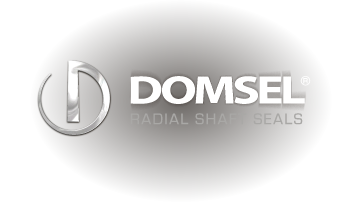Properties and durability of elastomers: An in-depth analysis
Support parts
The support parts of the standard version are made of unalloyed steel to DIN 1624 (St.12). Stainless, acid-resistant steel to DIN 1.4301 or non-magnetic materials can be used for special designs.
Pressure ranges
When pressurized, the short sealing lip enables a small lever arm, so that much higher pressure ranges can be covered without additional support parts – in contrast to normal sealing rings with worm springs. For pressure ranges greater than 6 bar, please ask for our technical advice and specify the pressure value when ordering. The AC design is used for alternating pressures (negative pressure to positive pressure).
Elastomers Properties and applications
Art.-No.: E-10011
Hardness: 74
Operating temperature: -30°C to +90°C
Color: Black
FDA: No
Properties: Standard material for many general applications in the lower price segment
Art.-No.: E-10006
Hardness: 80
Operating temperature: -35°C to +120°C
Color: Light
FDA: 177.2400
Properties: For applications in the food sector
Resistance: mineral oil, grease, water, gases such as air
Art.-No.: E-10009
Hardness: 80
Operating temperature: -35°C to +140°C
Color: Black
FDA: 177.2400
Properties: Extremely wear-resistant material. Recommended for applications with abrasive particles such as dirty water, dust, etc. High durability.
Resistance: mineral oil, grease, water, gases such as air, alkalis, water vapor
Hardness: 69
Operating temperature: -45°C to +130°C
Color: Black
FDA: No
Properties: Attention: Not resistant to mineral oils!
Use silicone-based lubricants.
“Outdoor rubber” when exposed to sunlight
Art.-No.: E-10018
Hardness: 80
Operating temperature: -40°C to +130°C
Color: Black
FDA: 177.2400
Properties: For applications in the food sector
CIP Systeme
Resistance: Gases such as air, suds, water vapor, generally high chemical resistance,
Attention is not compatible with mineral oils!
Hardness: 80
Operating temperature: -10°C to 210°C
Color: Black
FDA: No
Properties: High-quality material. Not resistant to water vapor and alkalis! Standard for general applications. For surface speeds > 8m/s
Art.-No.: E-10004
Hardness: 80
Operating temperature: -12°C to 210°C
Color: Grey
FDA: 177.2400
Properties: For applications in the food sector
Resistance: Mineral oils, mineral greases, water, gases such as air, acids, generally high chemical resistance.
Hardness: 72
Operating temperature: -20°C to +200°C
Color: Black
FDA: 177.2400
Properties: For increased requirements
Resistance: Vapor resistant in addition to FPM
Hardness: 79
Operating temperature: -10°C to +200°C
Color: Black
FDA: 177.2400
Properties: PTFE additive improves lubricity. For applications in the food sector
Resistance: Mineral oils, mineral greases, water, gases such as air, acids, generally high chemical resistance.
Hardness: 70
Operating temperature: -10°C to 230°C
Color: White
FDA: 177.2400
Art.-No.: E-10003
Hardness: 72
Operating temperature: -10°C to +300°C
Color: White
FDA: 177.2400
Properties: This high-quality material is used when the chemical resistance of FPM is not sufficient or high temperatures are required.
Also for applications in the food sector
Very expensive material.
Resistance: oils, petrol, low-viscosity media such as water, acids, diluted alkalis, steam, cleaning agents, alcohol, very good resistance to chemicals and media
Hardness: 80
Operating temperature: -40°C to +200°C
Color: White
FDA: 177.2400
Properties: This material is used where cold stability is required. Has less good mechanical properties than other elastomers.
Resistance: aliphatic oils and fats, animal and vegetable oils and fats, water, hot water and steam up to 120°C
*FPM is the international abbreviation according to the DIN-ISO standard, while
*FKM is the abbreviation for fluoroelastomers according to the American ASTM standard
The maximum temperature must not be exceeded at the sealing lip. The maximum permissible temperature is made up of the ambient temperature and the frictional heat. The frictional heat depends on the rotational speed (surface speed of the shaft), pressure and lubrication. If a material is permanently operated at the limit of its temperature resistance, the service life is shortened.
Elastomer seals are not suitable for dry running. If there is no ambient lubrication, use the double-lip versions and fill the space between the lips with grease to lubricate the sealing lips (see installation instructions).
Most materials can be supplied FDA-compliant for use in the food industry. In the food industry, the cleaning process is often decisive for the selection of a suitable material.
If you cannot find a material for your application in the table, we can also procure most materials in small quantities.
For further information on materials and applications, we will be happy to advise you. Please contact us!


